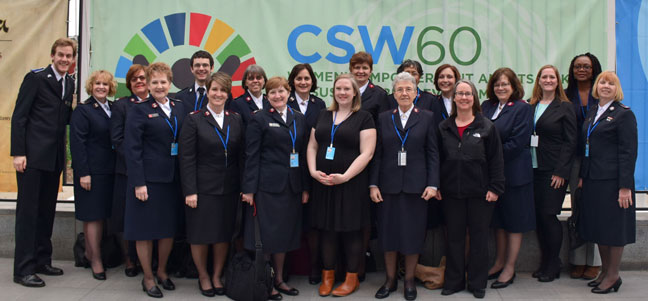The Salvation Army hosted 105 of the meetings at the International Social Justice Commission building in New York. Salvationist delegates in attendance represented New Zealand, Canada, the United States, Australia, Norway and Switzerland.
The CSW is a global policy-making body that meets annually and is dedicated to promoting gender equality and the empowerment of women. Established in 1948, it has a mandate to prepare recommendations on promoting women's rights in the political, economic, civil, social and educational fields. The Commission also makes recommendations to the council on urgent problems facing women that require immediate attention.
This year's theme was "The Empowerment of Women and the Link to Sustainable Development." The Sustainable Development Goals were agreed by all 193 UN member states in September 2015. The 17 SDGs present a vision of a world that is fair, just and equitable for all people. Women and girls form half the world's population and are often among the most vulnerable and marginalized.
The overarching message of CSW 60 was that women are essential to achieving the SDGs and women have both the right and the responsibility to participate in the achievement of not only Goal 5 – to achieve gender equality – but all 17 goals. The meeting addressed the many intersecting issues related to the empowerment of women and sustainable development. These included well-recognized concerns such as gender-based violence, women's health, human trafficking, women's legal and property rights. Less recognized concerns were also discussed such as challenges faced by women in law, media and parliament; unequal income generation opportunities; and the disproportionate impact of climate change and humanitarian crises on women and girls.
Presenters came from all parts of the world representing the global diversity of the issues. Perspectives were shared from both secular and different faith viewpoints. A significant number of men participated in the CSW, recognizing the importance of men and women working together to address issues of inequality and injustice.
The Salvation Army delegation reports that this was a stimulating and encouraging experience, enriched by the fellowship experienced within the group and with other like-minded delegates.










Leave a Comment